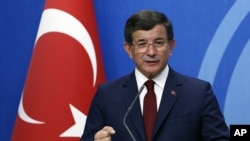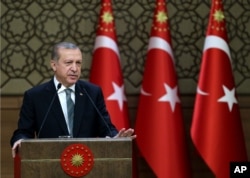Turkish Prime Minister Ahmet Davutoglu said he will step down as his ruling AK Party announced an extraordinary congress to elect a new leader. Davutoglu’s decision comes amid reports of his growing differences with Turkish President Recep Tayyip Erdogan.
In a carefully worded statement to the country’s media, Davutoglu said he would be stepping down at the AK Party congress to be held on May 22. He claimed his premiership has been a success, underlining his landslide victory in last November's election. But alluding to growing differences over his leadership, he said he was stepping down for the sake of unity and consensus in the party.
But the prime minister was careful to reaffirm his loyalty to the president.
"I feel no reproach, anger or resentment against anyone," he said. "No one heard, or will ever hear a single word from my mouth, from my tongue or my mind against our president."
But in the past few months there have been reports of growing differences between the prime minister and Erdogan. Supporters of the president have accused Davutoglu of opposing Erdogan's ambitions of replacing Turkey's current parliamentary system with a presidential one, while Davutoglu has tentatively voiced concerns over an ongoing crackdown on critics of the president.
On Monday, Erdogan loyalists in the AK Party stripped the prime minister of his power to appoint regional party heads, while the president this week issued a thinly-veiled warning to Davutoglu, saying he should remember who appointed him.
Davutoglu met Wednesday with Erdogan to resolve their differences, but Cengiz Aktar, a political scientist at Istanbul’s Suleyman Sah University, said the prime minister's fate was already sealed.
"For some time, he was growing in his position and that is unacceptable to Mr. Erdogan. He is and he was his [Erdogan's] creation and started to become independent, developing new ideas, etc. And this didn't please Mr. Erdogan and ... he pushed him [Davutoglu] out."
One of the prime minister's initiatives was to craft a deal with the European Union, whereby Turkey accepted migrants returned from Greece in exchange for a series of concessions, including visa-free travel to Schengen-zone countries in the European Union. This week, the European Commission gave a conditional green light to visa-free travel.
While Brussels has made little secret of the fact that it would rather deal with Davutoglu than Erdogan, who is increasingly accused of authoritarianism, observers say Davutoglu's removal sends a message that Erdogan is the only person who wields power in Turkey.
Kemal Kilicdaroglu, leader of Turkey's main opposition Republican People's Party (CHP), called the prime minister's resignation a "palace coup."





